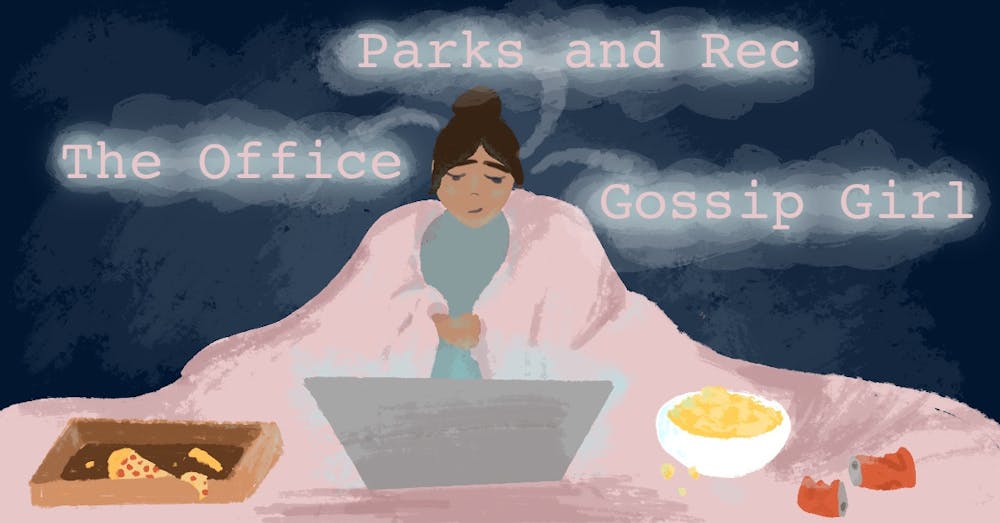When the world turns to chaos, the people turn to television.
The pandemic was enough to make stress a familiar feeling to 21-year-old UF biology junior Toshita Barve. While she said the early months of lockdown had her mostly bored and restless, the added academic pressure of online classes led her to feel overwhelmed toward the start of the Fall semester.
Barve said she discovered one of her favorite shows, the Thai television series “2Together,” in June, and it quickly became a source of comfort during otherwise overwhelming and unpredictable times.
“It’s a very light-hearted show, and it has a happy ending,” she said. “Everything else was gloom and doom, but I could watch this show.”
Following the first wave of lockdowns in the early months of 2020, Netflix received 16 million new subscribers, which is nearly double the number seen in months prior. Simultaneously, time spent watching TV and streaming videos online skyrocketed.
UF telecommunication professor Yu-Hao Lee attributes this surge in media consumption to psychologist Dolf Zillman’s mood management theory, which states individuals use media to regulate their emotions toward a leveled, pleasant state.
“Our memories of TV shows are not only of the content but the context in which we experienced them,” Lee said. “By watching comfort shows, we are reminded of our childhood, watching with our family and friends. The good old days.”
Light-hearted plots that require little cognitive effort, conventional genre tropes and familiar characters become appealing candidates for consumption, Lee said, allowing for the continued popularity of shows like “Friends” and “Seinfeld.”
Being a distractor from external events and stressors also plays a large role in certain shows’ popularities. Mood management theory cites absorption potential, or how consuming a show is, as a key factor in how effective media is in balancing overwhelming emotions.
“If a show is very distracting, you’re more likely to focus on the show and take your mind off whatever it is that’s stressing you out,” Lee said, “But if something is not very distracting, you’re less likely to take tension off what’s causing the stress.”
Early-pandemic viewing patterns also reflected an overwhelming consumption of comfort TV, which is a category of media that heavily contrasts the unfamiliarity of quarantine.
Though the precise definition of the term differs from person-to-person, UF advertising professor Benjamin Johnson describes comfort TV as inciting positive emotions, meaning and familiarity among its viewers.
“Some people are going to find certain types of media more comforting than others just because of the history they have,” Johnson said. “Nostalgia is important.”
During the onset of COVID-19, many began to use media as a coping mechanism, according to a survey co-conducted by Johnson, among UF and Michigan State University students. Students were found to utilize media, especially television, as a vehicle for five distinct coping strategies: dealing with problems, avoiding problems, escape, reframing problems and humor. The predominating emotions individuals felt tended to influence the media they consumed, Johnson said.
“The people who were very stressed wanted media that was not problem-focused, they weren’t interested in looking for meaning - they wanted quick fixes,” said Johnson. “People who were really anxious were looking to reframe the problem in their mind or choose media that helped them make sense of COVID.”
Sparsha Muralidhara, 20-year-old UF cognitive behavior neuroscience and linguistics junior, said she prefers TV shows that are more carefree and comedic than dark or heavy. For this reason, she found herself returning to old favorites like sitcoms and animated series during quarantine.
She said TV series like “Psych,” “Parks and Recreation” and “She-Ra and the Princesses of Power” defined her months in lockdown. Familiarity and a relative lack of realism became a comfort, she said, especially when real-world events grew increasingly draining to confront.
“There’s already so much heaviness on a day-to-day basis,” she said, “It’s nice to be able to slip into a false reality where everybody cracks jokes and gets on with their lives.”
Muralidhara said she also came to view TV as a method for grounding herself when everyday life began to rapidly change around her. Work, school and socializing with peers suddenly became unfamiliar territories, tainted by the strangeness of social distancing and remote learning.
She said she began to feel stressed about the health of herself and her loved ones. With much of her family being in India and immunocompromised, Muralidhara said constantly keeping tabs on her high-risk relatives while also remembering to attend to her health grew grueling. But where real life became a source of uncertainty, she said, television provided a well-needed sense of predictability.
“It’s nice to be able to turn to something where you know what the end result is going to be,” Muralidhara said. “It’s not something that you have to control or prepare for.”
Compared to other forms of media, such as the news or gritty drama series, this kind of formulaic television has proven to be a remedy to feelings of exhaustion and overload. Muralidhara described it in relation to a battery.
“Comfort shows recharge it,” she explained, “They put something back in you.”

Veronica Nocera is a third-year journalism major, history minor and The Avenue editor. She spent two semesters reporting arts and culture for The Alligator and also writes for Rowdy Magazine. When she’s not writing, she’s probably reading, journaling or taping random pictures to her wall. Also, she’ll probably be wearing yellow.






